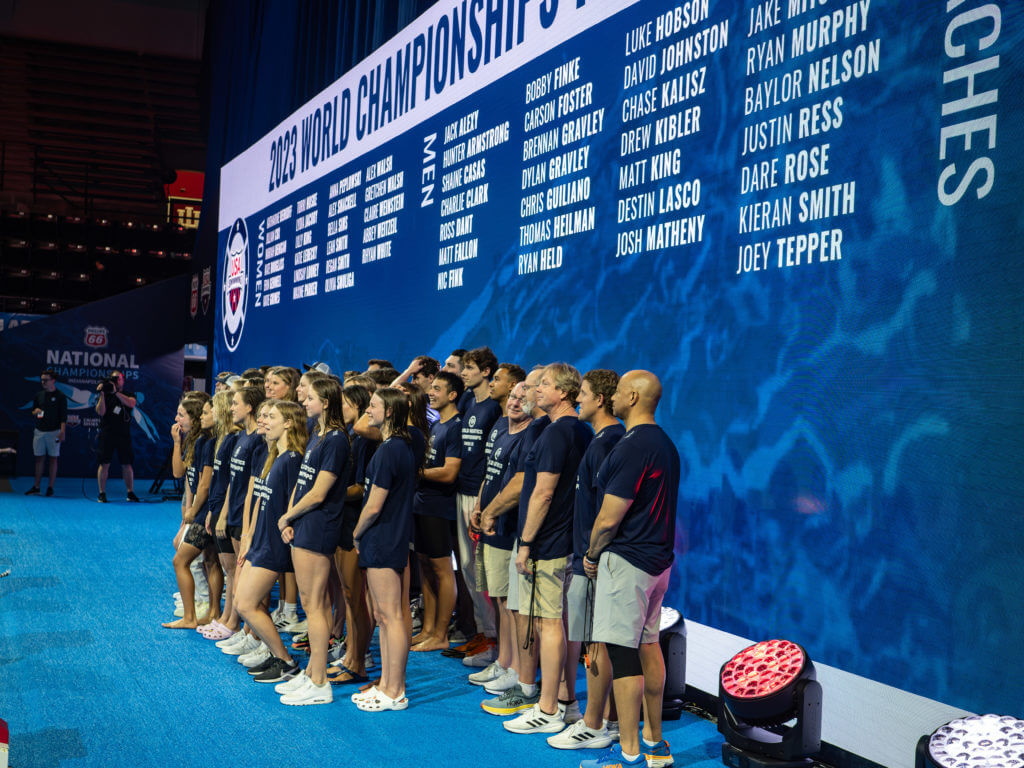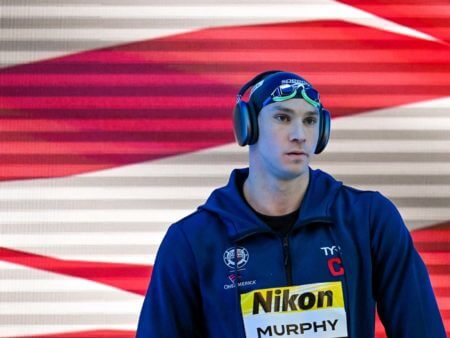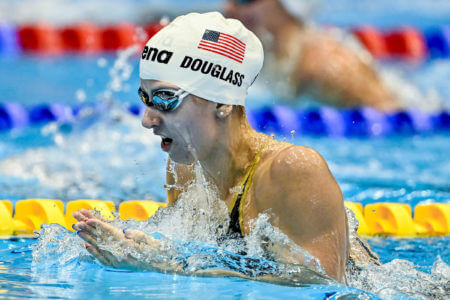United States Swimmers Leading Medal Count But Golden Glow is Missing

Editorial content for the 2023 World Aquatics Championships is sponsored by FINIS, a longtime partner of Swimming World and leading innovator of suits, goggles and equipment. United States Swimmers Leading Medal Count But Golden Glow is Missing The race had unfolded about as well as the United States could have hoped. Ryan Murphy had given the Americans a lead in the mixed 400 medley relay World Championships final, and Nic Fink had stayed close enough to Chinese breaststroker Qin Haiyang. With less than a half-second deficit at the halfway point, the Americans had reason to feel confident in the women swimming the latter two legs of the relay. Yes, China’s Zhang Yufei was the world champion in the women’s 100 butterfly, but the U.S. had Torri Huske, the winner of that title last year and the bronze medalist in this year’s final, finishing a half-second behind Zhang. Her season-best time of 56.18 was only four hundredths behind Zhang’s winning time from Fukuoka. So no worries, right? Don’t lose much ground, and give Kate Douglass a chance to run down inexperienced Chinese freestyler Cheng Yujie on the end. With two solid splits, the Americans could earn their first relay gold medal of the meet. Instead, Huske struggled as Zhang shined, the Chinese swimmer splitting 55.69 compared to the 58.19 of Huske. These two usually-close rivals were separated by a full two-and-a-half seconds. On the butterfly leg, Australia’s Matt Temple pulled his country into second ahead of the Americans, and despite a 51.79 anchor split from Douglass, the quickest ever by a U.S. swimmer, the team finished 1.46 seconds away from gold and 1.16 seconds from silver. The American foursome left Marine Messe Fukuoka with a bronze medal and the knowledge that if Huske matched her season-best time, they would have been golden. Poor swims happen, even to world-class swimmers at the worst possible moments, so but over the first half of the World Championships, the United States has come up short on several occasions. The mixed medley was just the latest in a series of what-could-go-wrong moments. Ryan Murphy has been a bright spot for the United States in Fukuoka — Photo Courtesy: Andrea Staccioli / Deepbluemedia / Insidefoto With 19 sets of medals awarded thus far, the Americans have reached the podium 17 times, as many as the next two winningest nations (Australia and China) combined. But gold medals have been elusive so far, with only Murphy, Douglass and distance great Katie Ledecky having reached the top step for one individual gold medal each. International rivals are out-performing the American team in big moments, often in cases where U.S. swimmers are failing to reach their season-best times from U.S. Nationals less than one month ago. Huske’s 100 fly swim was one of those occasions, and the next day, Lilly King ended up fourth in the 100 breast in 1:06.02, nowhere close to her 1:04.75 winning time from Nationals. King and Lydia Jacoby looked primed for a 1-2 finish at Worlds, but the Americans only ended up with Jacoby’s bronze. Ruta Meilutyte scorched a time of 1:04.62, which probably would have been good enough for gold anyway, but Jacoby, too, was seven tenths off her 2023 best. On the men’s side, medal chances were fewer with plenty of young talent filling out the ranks in a U.S. squad missing Caeleb Dressel, but the Americans might have extended their winning streak in the men’s 400 free relay if Ryan Held had matched his season-best time on the leadoff leg. Carson Foster was in line for his second medal of the meet in the men’s 200 fly before fading badly on the last 50. In plenty of the other exasperating finishes, the American swimmer has performed fine while a foreign swimmer overperformed. Think Regan Smith in the women’s 100 back (silver), Bobby Finke in the men’s 800 free (bronze) or even in Wednesday’s 200 butterfly when rapidly-improving teenager Thomas Heilman surged through the field at the end to tie for fourth. The standard set through decades of U.S. dominance has been the ability to perform at big moments, occasionally with stunning improvements but more commonly by each swimmer fulfilling their capabilities despite the tension of international racing. The thinking goes that U.S. selection meets are so competitive that the World Championships are Olympics are somehow less-pressurized environments while team chemistry among the swimmers provides a lift. That has been the case at several Olympics and even at last year’s Worlds, where the Americans won 45 medals and 17 gold. Medals are still coming all over the place in Fukuoka, but the golden swims, the clutch performances that galvanize a team, have been absent. So many races that looked like 50-50 chances are breaking away from the U.S. Of course, the Americans have received their own luck at moments. Douglass and Alex Walsh went 1-2 in the 200 IM after favorites Summer McIntosh and Kaylee McKeown were both missing from the final. Murphy got the job done in the 100 back thanks to a brilliant finish good enough to surpass world-record holder Thomas Ceccon. Ledecky was never going to lose the 1500 free, and it’s considered a near-certainty that Ledecky adds another gold in the 800 free and Murphy does the same in the 200 back. But aside from that, there are no other absolute-lock American gold medals remaining. Even on relays, the events in which the Americans place so much importance, so much that USA Swimming introduced a relay incentive program to encourage success this year and at next year’s Paris Olympics. The top prize is a $1 million pot to be distributed among all team members if the U.S. sweeps all seven relays in Paris. How’s that going so far? Well, three relays so far have produced one silver medal and two bronzes, with Australia finishing ahead on all three occasions. Don’t expect that to change Wednesday in the women’s 800 free relay. Even with Katie Ledecky and some talented teenagers joining the squad, the Aussies will have 200 free world-record breaker Mollie O’Callaghan and 400 free world-record breaker Ariarne Titmus fronting their squad. And Australia has exceptional depth How do you beat that? Kate Douglass has already won three medals in Fukuoka — Photo Courtesy: Andrea Masini / Deepbluemedia / Insidefoto The men’s 800 free relay one day later? Great Britain just finished 1-2 in the men’s 200 free with Matt Richards and Tom Dean, with veterans Duncan Scott and James Guy likely to join the squad. The mixed 400 free relay goes back to Australia, with the Aussies coming off a pair of 400 free relay wins. The best American chances for gold will come in the single-gender medley relays, but China and Italy will be formidable in the men’s. The women’s medley relay looked like an easy candidate for gold entering the meet given that Australia is missing its two would-be top breaststrokers (Chelsea Hodges and Jenna Strauch, both out with injuries), but Huske just split above 58 on a mixed relay. If her struggles continue, the U.S. coaches will have to consider moving Douglass to butterfly and inserting Abbey Weitzeil on the anchor leg. At present, the guess would be the U.S. finishes this meet with one relay win, which would mark the country’s worst performance at a major competition since the 2001 Worlds, also in Fukuoka, when the Americans were shut out. In 19 previous editions of the World Championships, that’s the only time Team USA has won less than two relays. The standard for a decade-and-a-half, a stretch running from the 2003 Worlds in Barcelona to the 2017 meet in Budapest, was three to four American relay wins per major meet, but there has been slippage in recent years. At the Tokyo Olympics, the U.S. team won only two relays while poor strategical decisions meant that two of those squads, the men’s 800 free and mixed 400 medley, ended up off the podium altogether. This year, the situation is even more bleak. Expect to hear a refrain from the American team that the focus is on the Olympics, that this World Championships is simply a tune-up for the meet that really matters is one year away. Truthfully, underperformance at the one-year-out World Championships has become familiar pattern after disappointing results in 2015 and 2019, but remember that those teams were selected one year in advance. This time, due to the shorter Olympic cycle following the delayed Tokyo Games, the selection meet concluded three weeks before the start of Worlds, so this team is the best American grouping for 2023. Medals are wonderful accomplishments, and there is plenty to tout with 17 American medals so far and more surely coming, likely four more in Thursday’s finals. But success is judged based on gold medals, with special emphasis given to relays. For this World Championships to be considered successful by the long-running American standards, an uptick in gold medals and multiple relay wins must follow. If not, one year remains for improvements before Paris. Maybe Fukuoka becomes a valuable seasoning meet for the young Americans on this squad, and the veteran group peaks for the Olympic year, perhaps with Dressel making a grand return. Maybe — but a repeat of the Fukuoka results in Paris would be an unsatisfying outcome for the Americans.









This editorial is unnecessary, rude and degrading.
Sorry…not sure what you are driving at. It is pro American and lacks balance. I am sorry just as my home country Australia underperformed in London and Rio, the good old USA has underperformed here. The numbers are factual. The key will be what is learnt. Sometimes we need to cop it on the chin and work on things.
Thank you for the great article. What do you think is the reason, that the results are universally worse than at the trials? Some big mistakes in the training process during the three weeks after the trials? Can not think of anything else.
Did you just suggest that Kaylee Mckeown over performed in the 100m Backstroke?
100%. Article is biased against non USA swimmers
US trials were too close to this event and it appears as if many missed a good taper
The medal count is determined by gold medals.
Exactly the whole earth bar the USA goes on Gold won
Some of our older , more experienced swimmers may be past their most outstanding previous efforts. What is encouraging is the younger one’s learning, gaining some success and perhaps improving as time goes on. The outstanding athletes from other countries have a lot to do with the relatively poor American results.,
At this point with so many swimmers training in the US, but represent other countries, I count as a W for The USA. Because Leon Trains in America, Summer McIntosh does, and many others as well. So the coaching in the U.S has to be at least contributing to other countries medal counts too. That’s just my take though.